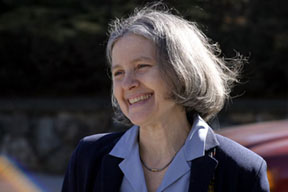Published September 13, 2010

Jill Stein (courtesy of the campaign)
Every election has this candidate: She does not stand a realistic chance of winning, but she is on the ballot. How should we cover her?
This perennial question showed itself again when the Boston Media Consortium — which includes The Boston Globe, NECN, Channel 7, Channel 5, Channel 2 and WBUR — decided to exclude Green-Rainbow gubernatorial candidate Jill Stein from a Sept. 21 broadcast debate. Stein had not raised enough money to meet the consortium’s criteria for participation.
“The Boston Media Consortium thinks that they can silence our voices!” complained Jeff Boudreau on our Facebook page.
Today the consortium announced an about-face: Stein will be able to participate after all, since the debate falls before the Oct. 1 fundraising deadline. Earlier, before the decision was reversed, our ElectionWire political analysts chimed in.
Democrat Dan Payne wondered, “Why should a candidate with no chance of winning take up one-fourth of the time in debates that will help determine who governs Massachusetts?”
But Republican counterpart Todd Domke said Stein’s participation in debates is a matter of fairness — to the public:
Dr. Stein already proved her credibility. The media consortium came up with these criteria to keep wacko candidates from ruining constructive debates. But in the last debate, Stein was the only candidate to exceed expectations. Many viewers were surprised that she was as articulate and knowledgeable as the “serious” candidates. Now we’re supposed to pretend she is not on the ballot, not an option, not newsworthy, not a factor in a four-candidate field?
Of course, a Democrat (Payne) would have an interest in keeping out the candidate who might siphon votes from the Democratic incumbent. And a Republican (Domke) would want the incumbent’s re-election battle to be that much harder.
NU media thinker Dan Kennedy argues it might be time to ditch the consortium model altogether — which was formed in 1994 to pressure Sen. Edward M. Kennedy to debate Republican challenger Mitt Romney. Kennedy opines:
Give the longshots a chance to make their pitch and force the major-party candidates to react to their ideas. As we get closer to the wire, I think it’s legitimate to use polling in order to exclude candidates with no chance. I’d like to see Baker and Patrick debate one on one, but not yet.
What do you think? Does Jill Stein deserve equal access to debates? How would you rate our coverage?
More Coverage: